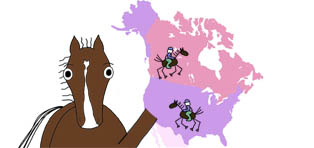by Phil Gardner
A few years ago Marvin Jacinto coined the phrase "this ride ain't for snivelers". Evidently the word got out because the snivelers didn't show up this year. What a great group of competitors we had from 13 countries all around the globe! It showed in the sportsmanship exhibited on the trail and in the number of completions at the finish. We saw several riders receive their buckle after failing to make the finish in previous attempts. The completion rate was 57.5% a record for the current trail. Congratulations to all.
Heather Reynolds from Dunnellon, Florida, riding a 14 year old gelding named French Open (Hadea) was the winner of the Tevis Cup. She was part of a group that had traveled together most of the day. At exactly 9:00 pm Heather, Tennessee Lane from Windsor, Colorado, riding WH Pico's Shazam (Shazam!) and Tom Johnson from Loomis, California, riding AM Lady Liberty Wins (Libby) left the Lower Quarry vet check, six miles from the finish, together. Thirty-two minutes later Heather crossed the finish line, followed in six minutes by Tennessee and in another three minutes by Tom. It was one of the most exciting finishes in recent memory. All the horses looked fantastic and easily passed their vet checks.
This is the second time Heather has received the Tevis Cup, winning it in 2003 riding Master Motion. Her husband Jeremy is no stranger to the Cup either, winning it three times in 2011, 2007 and 2004, quite an impressive record for the family duo.
One hour and eight minutes later Barrak Blakeley from Terrebonne, Oregon, riding MCM Last Dance, a 17 year old gelding, crossed the finish line. The pair was awarded the coveted Haggin Cup at the Sunday awards ceremony. Barrak is the first junior to win the Haggin Cup.* He is no stranger to the ride with four Tevis starts; this is his second Tevis finish. He has paid his dues in both successes and failures on the trail. We are very proud to see one of our junior riders receive this honor.
The Haggin Cup was first awarded to Paige Harper in 1962. In the early days many people thought that endurance riding was just a bunch of crazy people, who didn't care about their horses, running down the trail as fast as they could. To show that this wasn't the case, the Haggin Cup was established. To many the Haggin Cup is considered equally prestigious to the Tevis Cup. At 10:00 am the morning after the ride the veterinarian committee examines the top ten finishers and chooses the horse most fit to continue at that time. Neither speed nor weight carried the day before are factors to be considered, only the fitness of the horse. Wendell Robie put it this way. "Imagine you were in the old west and were attacked by outlaws and had to choose a horse out of the top ten to flee for your life, which one would you choose?" That was the premise of the Haggin Cup in 1962 just as it is in 2014.
The Haggin Cup is a prestigious award on its own. Many riders plan their ride to compete for this cup, not the Tevis Cup. Such a strategy may be completely different than one you would use for going for the Tevis Cup. One plan might be to try to take your time, save your horse and shoot for 9th or 10th place. The Haggin Cup is not a consolation prize for not getting the Tevis Cup; it is a completely different competition. In fifty two years only hand-full of people have managed to win the Tevis and Haggin cups in the same year.
This award for best condition became the standard for endurance riding and was one of the original five principles of AERC. Over time as AERC developed, they decided to add speed and weight carried as part of best condition judging criteria. When the Western States Trail Ride (WSTR) decided to join with AERC and become an AERC sanctioned ride it was granted special dispensation that allowed WSTR to continue to use the original best condition judging format. That is why the Haggin Cup judging is different than any other AERC sanctioned ride.
In closing, I would like to thank the 2014 volunteers, ride director Chuck Stalley, the veterinarians, and Board of Governors. Thanks to your hard work, dedication to the Tevis and labors of love the 2014 Tevis Cup Ride will go down in history as one of the best ever.
* In 1972 Hal Hall won the Haggin Cup when he was 17. The rules in 1972 stated that a junior rider was 16 and younger and had to ride with a sponsor. At 17 years old a rider was considered an adult rider and did not have to ride with a sponsor. So Hal Hall was an adult rider in 1972. Prior to 1972 there was no rule requiring a sponsor for a junior rider nor were junior riders identified on the ride post ride charts. All junior rider records prior to 1972 are unofficial records.
Phil Gardner
President Western States Trail Foundation

No comments:
Post a Comment